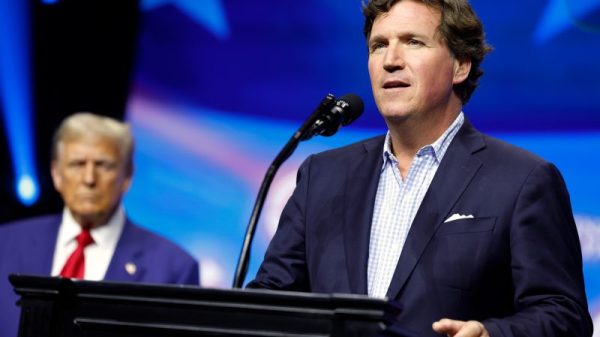House Republicans have been in power for nearly two years — and they’re still unable to solve fiscal problems within their ranks.
The belligerent nature of the conference, coupled with a historically narrow majority, has made it almost impossible for any GOP leader to appease each corner of their constituency when nearly every Republican vote is necessary to pass bills along party lines.
Now House Speaker Mike Johnson (R-La.) is once again in the middle of the tensions that almost a year ago saw his predecessor ousted in part for refusing to fund the government the way a small group of far-right members demanded. But Johnson still worked through the weekend to rally support for his already-once-delayed proposal to avert an Oct. 1 government shutdown on terms friendly to the GOP, which he hopes to put to a vote this week.
“I believe we can fund the government responsibly, and I believe we can do right by the American people and ensure the security of our elections. I defy anybody to give me any logical argument why we shouldn’t do that. That’s why I’m so resolute about this,” Johnson told reporters last week.
Johnson’s measure would extend government funding into March — longer than Democrats and even some Republicans prefer — and tacks on provisions requiring proof of citizenship to register to vote that election officials say are unnecessary and Democrats say they can’t accept.
Many House Republicans consider the effort futile, since a solid block of GOP opponents remain unpersuaded to vote for any temporary funding extension and the Democratic-led Senate and White House have already rejected the plan. If all lawmakers are present and voting, Republicans can only lose four votes from their conference to pass a bill.
It all but sets up another fight between Republicans who want to prove to voters they can govern ahead of Election Day and others who would rather see Johnson fight aggressively for conservative policies — even if it means shutting the government down and risking their majority. The internal standoff could once again tarnish Republican efforts to send Johnson into bipartisan negotiations with the credibility to seek concessions ahead of the looming deadline.
“Let’s just be honest: Republican lack of unity has often sent us into negotiations with less leverage than we should have,” Rep. Dusty Johnson (R-S.D.) said. “That is a fact of being in a conference that values rugged individualism over collective action.”
In talks over the summer, Johnson and his leadership team sensed that a majority of Republicans would support extending current funding levels — known as a continuing resolution, or CR — until March 28, 2025, and attaching a voter ID bill that passed along mostly party lines in July.
But the proposal was quickly met with continued skepticism from Republicans’ pragmatic flank, and rage from some on the far right. A staunch block of hard-liners who have never supported a CR forced Johnson to delay a vote from Wednesday into this week. And many of those roughly dozen Republicans are not budging, as calls from across the conference for Johnson to “get serious” in negotiations grow louder.
Senior members of the Appropriations Committee, which drafts full-year spending bills, agree with Democrats’ preferred approach to extend current funding levels until December so lawmakers can pass new spending bills and clear the slate for the next president, whoever wins. The House has passed five of the 12 full-year spending bills, some with steep cuts; the Senate has passed none, but all 12 are also through the appropriations panel there.
Appropriators were willing to back Johnson’s measure for the sake of projected unity and to help him enter bicameral negotiations with leverage.
“The speaker tried to deliver,” Appropriations Committee Chairman Tom Cole (R-Okla.) said. “And he didn’t lose because of people on my committee and people who wanted a shorter CR. He lost because of a disparate group of people who said, ‘I don’t like the long CR, I want this, I want that.’ Come on.”
Johnson has remained adamant about twisting arms for his current plan, showing little willingness to renegotiate it. A year ago, then-Speaker Kevin McCarthy (R-Calif.) spent weeks gathering Republicans in conference rooms to cobble together short-term plans — once using a whiteboard — that were continuously rejected by members of the archconservative House Freedom Caucus, who wanted more spending cuts and border security. Eventually, he had to rely on House Democrats to pass a clean funding extension and avert a shutdown, a decision that contributed to his removal.
But that style of just-for-show politicking is considered old-school by a new crop of Republicans who demand all-or-nothing fights, particularly on reducing government spending. Republicans have seen leaders such as McCarthy, Paul D. Ryan (Wis.), and John A. Boehner (Ohio) before him, go through the motions of passing a GOP plan to appease the far right, only to return from negotiations in divided government with a bipartisan deal.
Rep. Thomas Massie (R-Ky.), who has voted against CRs, said Johnson’s current plan is a “fake fight” and GOP leaders “would cave at the end.” Republicans from across the ideological spectrum have peppered Johnson with questions about the “final” funding plan, which have largely gone unanswered, as House Democrats and the Senate are waiting to negotiate after the House passes something.
“If they were serious about what they intend to do, then pass the bill themselves. But they’ve been unable to do that on their own,” House Minority Leader Hakeem Jeffries (D-N.Y.) said at his weekly news conference. “We are simply asking traditional Republicans to partner with House Democrats in a bipartisan way.”
Even Senate Republicans are growing antsy. Sen. John Boozman (R-Ark.), who sits on the Senate Appropriations Committee, said the lower chamber had until the beginning of this week to show signs of progress or the Senate would need to craft its own bill — probably without any of the conservative policies that House Republicans demand.
“I think the speaker is doing a very, very good job. You’re just in a situation where you’ve got virtually no majority and you’re struggling with people who are just not going to vote for a spending bill in the House,” he said.
Rep. Marjorie Taylor Greene (R-Ga.), who led a failed motion to oust Johnson as speaker earlier this year, said that Johnson should just start negotiating with Democrats rather than twist GOP arms — including hers — to support his plan.
Republicans who oppose short-term spending extensions say such moves only add to the deficit, which the party has promised to reduce. Johnson often notes that governing on spending and other conservative priorities could become easier if Republicans control Congress and the White House again, but many of his far-right colleagues are tired of waiting.
Unified GOP control is no guarantee of spending cuts, either: The debt grew from 102 percent of the United States’ total economic output to 104 percent during the two-year span when Republicans last controlled both chambers of Congress and Donald Trump was president, according to the Office of Management and Budget. And the discretionary spending that Congress considers as part of the appropriations process is a fraction of annual government spending, which is dominated by programs such as Social Security and Medicare.
Some far-right Republicans could support Johnson’s plan if they knew he would be willing to shut down the government when the Senate rejects the bill. But both McCarthy and Johnson have broken with past Republican speakers by choosing to avert shutdowns, arguing that they did little to extract concessions from Democrats and earned Republicans the blame.
But hard-liners believe that Johnson’s reliance on Democrats for must-pass bills has already hurt his negotiating position.
“When your enemy knows what you’re willing to do and not do, it makes it very difficult to negotiate. So because Schumer knows [leaders are] not willing to shut down the government, they’re going to, just like they have for the last two years, jam us,” Rep. Greg Steube (R-Fla.) said.
Pragmatic Republicans are growing frustrated at Johnson for still trying to keep the far-right coalition together for his current plan. But others are giving the speaker credit for trying to find consensus even if it is meant to send a message to the Senate.
“We’re in the majority and you have to at least engage with your colleagues,” said Rep. Michael Lawler (R-N.Y.), who represents a swing district that President Joe Biden won in 2020. “Yes, there’s going to be people that don’t vote for the final product, and if they’re unwilling to pass an initial offering toward a negotiation, then you move on without them.”






































